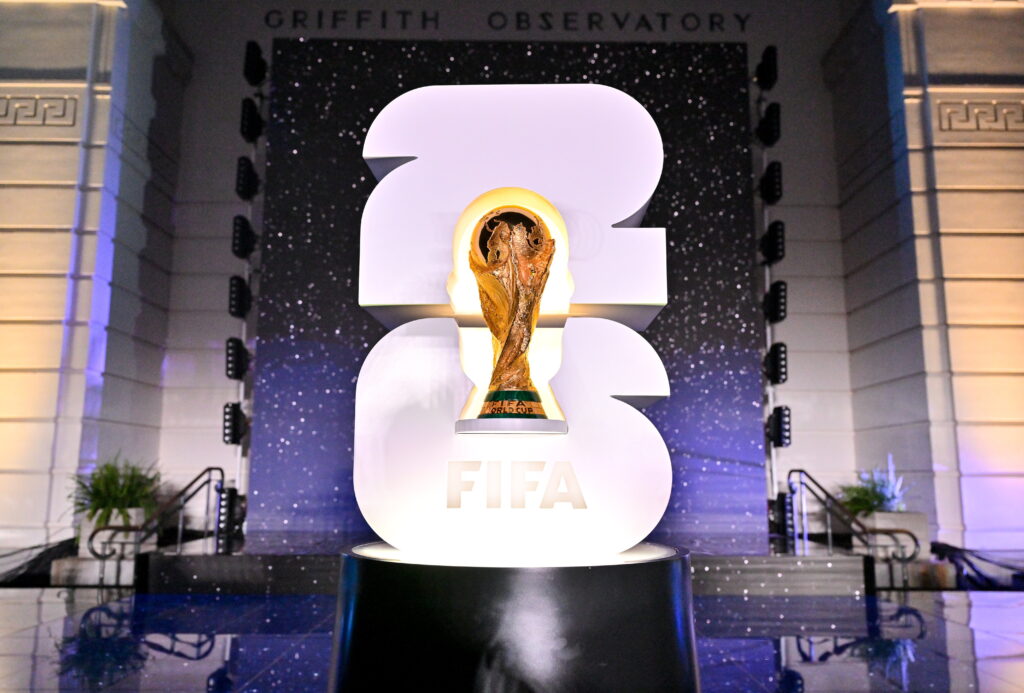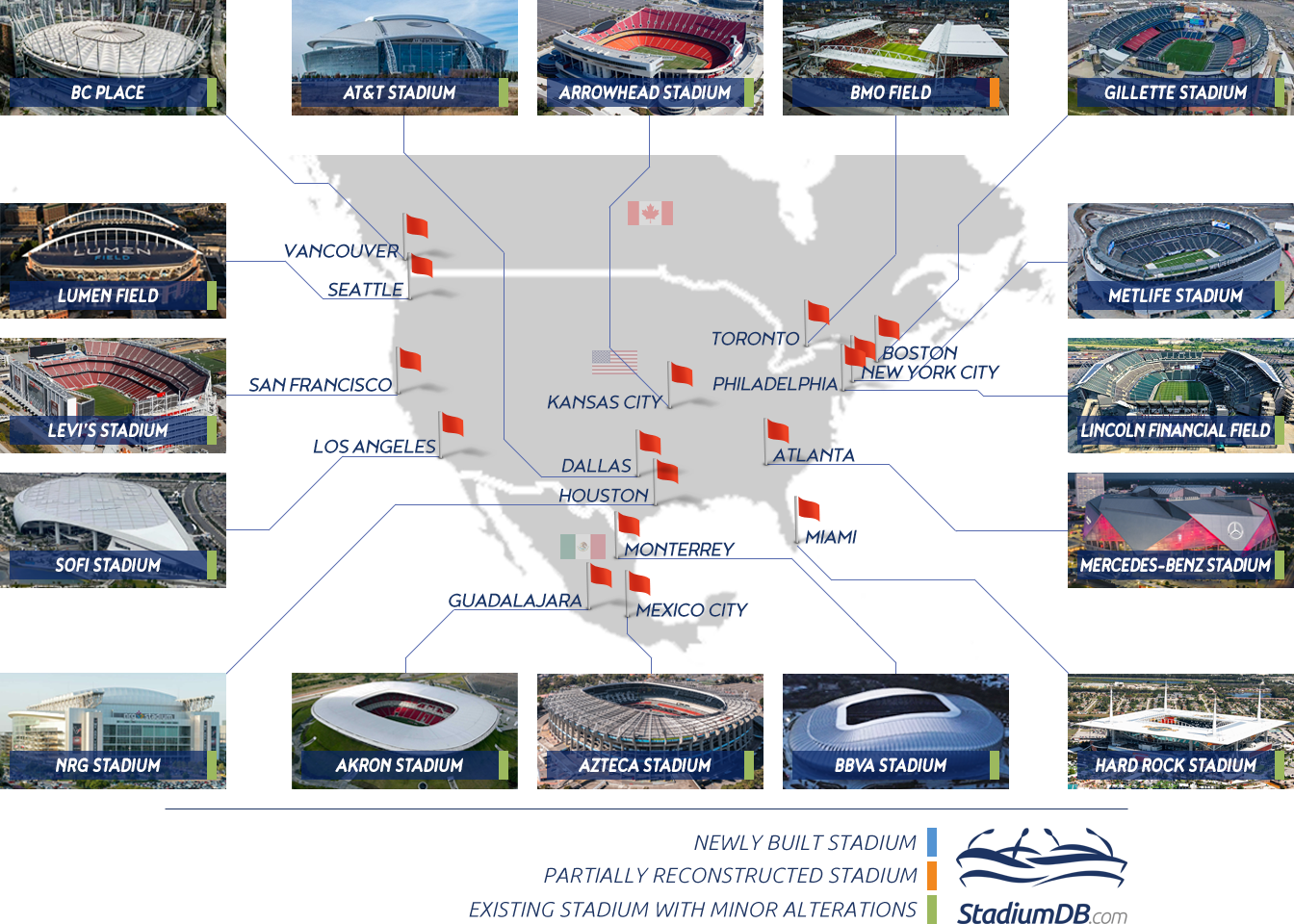The excitement is palpable as the FIFA 2026 World Cup host city has been revealed through the intricate site selection process. The Mundial FIFA 2026 is set to be one of the most anticipated events in the world of sports, promising thrilling matches and unforgettable moments. The selection of the host city is a crucial step in this prestigious event, as it will set the stage for the tournament and shape the overall experience for players and fans alike. Join us as we delve into the fascinating journey of how the host city was chosen and what it means for the upcoming FIFA 2026 World Cup.
Some throw-ins are more epic than others.
@FifaWorldCup @FernandoFiore#WeAreMiami #WeAre26 #FIFAWorldCup #MiamiStyle #305Life pic.twitter.com/PjZ8z5Ydq9
— FIFA World Cup 2026 Miami™ (@FWC26Miami) July 15, 2023
Introduction: Overview of the FIFA 2026 World Cup
The FIFA 2026 World Cup, also known as Mundial FIFA 2026, is set to be a monumental event that will captivate the world. With the selection of the host cities underway, anticipation is building for one of the largest sporting events globally.
Host City Selection Process
The selection process for the FIFA 2026 World Cup series involves careful consideration of various factors such as infrastructure, transportation, accommodation, and overall suitability as a host city.
Key Features of the Event
- The FIFA 2026 World Cup will feature the best national teams competing on the grandest stage, vying for the prestigious title.
- Fans can expect thrilling matches, cultural exhibitions, and an unparalleled atmosphere in the host cities.

History of FIFA World Cup Host Selection
The FIFA World Cup host selection process is meticulous, involving various criteria and considerations. Beginning in 1930, when the first World Cup took place in Uruguay, the host country was initially chosen by FIFA’s congress. However, as the tournament grew in popularity and importance, the selection process evolved.
Evolution of Host Selection Process
Over the years, FIFA implemented more thorough bidding processes to determine the host nation. In recent times, the process involves interested countries submitting bids detailing their infrastructure, logistics, and plans for the event. The FIFA Council then votes to select the host country.
This selection process ensures that the chosen host can meet the requirements for hosting a successful mundial FIFA event, including stadium capacity, accommodation, transportation, and security.
Recent Changes and Trends
In the lead-up to the FIFA 2026 World Cup, transparency and sustainability have become key factors in the host selection process. FIFA has emphasized the importance of environmental considerations, legacy projects, and social impact when choosing the host country for the tournament.
This shift towards more sustainable and inclusive hosting strategies reflects FIFA’s commitment to making the World Cup a global event that benefits not only the host nation but also the broader international community.

Evaluation Criteria for Selecting the Host City
When it comes to selecting the host city for the FIFA 2026 World Cup, several evaluation criteria are taken into consideration. From stadium infrastructure to accommodation facilities, various factors play a crucial role in determining the ideal location for the tournament.
Stadium Infrastructure
The host city must have state-of-the-art stadiums capable of accommodating the large number of spectators expected to attend the matches. These stadiums should meet FIFA’s standards for safety, security, and seating capacity.
Transportation Accessibility
In addition to stadiums, accessibility is key. The host city should have efficient transportation systems in place to ensure easy movement of teams, officials, and fans between venues, airports, and accommodations.
Having well-connected roads, public transportation, and proximity to major airports are essential criteria in the selection process.
Accommodation Facilities
Another important factor is the availability of high-quality accommodation options. The host city should offer a range of hotels, lodges, and rental properties to cater to the diverse needs of participants and spectators.
Announcement of the Host City for the FIFA 2026 World Cup
After months of anticipation, the official announcement of the host city for the FIFA 2026 World Cup has finally been made, sending waves of excitement throughout the footballing world. The Sede Selection Committee meticulously evaluated numerous bids from cities across the globe to determine the most suitable location for this prestigious event.
The Selection Process
The majestic FIFA 2026 World Cup host city selection process involved stringent criteria encompassing infrastructure, accommodations, transportation, and the overall capacity to host such a monumental sporting extravaganza. Each bidding city showcased its unique blend of culture, history, and passion for the beautiful game.
Revealing the Chosen Sede
Amidst much fanfare and anticipation, the host city for the FIFA 2026 World Cup was unveiled as the ideal destination to welcome teams, fans, and officials from around the globe. This decision marks a significant milestone in the journey towards one of the most anticipated mundial events in recent years.
The 2026 FIFA World Cup Sede promises to deliver an unparalleled experience for both players and spectators, combining the thrill of the game with the vibrant essence of the host city’s cultural tapestry.
Analysis of the Selected Sede for the FIFA 2026 World Cup
As the excitement builds for the upcoming FIFA 2026 World Cup, the selection of the side, or a host city, is crucial to the success of the event. The chosen sede plays a significant role in setting the stage for the tournament and creating an unforgettable experience for players and fans alike. With the mundial FIFA 2026 sede now revealed, let’s delve into the analysis of what this selection means for the upcoming World Cup.
Fan Experience and Infrastructure
The selected site for the FIFA 2026 World Cup must have top-notch infrastructure to accommodate the influx of fans and teams. From modern stadiums to transportation facilities, the fan experience is heavily dependent on the host city’s ability to provide a seamless and enjoyable environment. The Mundial FIFA 2026 sede needs to ensure that fans have easy access to venues and amenities to make their World Cup experience truly memorable.
Cultural Significance and Legacy
Hosting the FIFA World Cup is not just about the tournament itself but also about the host city’s cultural significance and the legacy it leaves behind. The selected site has the opportunity to showcase its unique culture, heritage, and hospitality to a global audience. This cultural exchange can have lasting effects on tourism, economy, and overall development long after the final match of the World Cup is played.
Implications of the Host City Selection for the FIFA 2026 World Cup
With the FIFA 2026 World Cup approaching, the selection of host cities plays a crucial role in the success of the tournament. Each host city brings its unique cultural heritage, infrastructure, and facilities to the event, creating a diverse and enriching experience for fans and players alike.
Enhanced Tourism Opportunities
The host cities selected for the Mundial FIFA 2026 sede will witness a significant influx of tourists from around the globe, leading to a boost in local economies and tourism industries. This presents an opportunity for these cities to showcase their attractions and hospitality to a global audience.
This increased exposure can have a lasting impact on the city’s reputation and tourism sector, attracting future visitors and investment.
Infrastructure Development and Legacy
Hosting the FIFA 2026 World Cup requires host cities to invest in upgrading their transportation networks, stadiums, and accommodation facilities. This infrastructure development not only benefits the tournament but also leaves a lasting legacy for the city, improving its overall quality of life and attractiveness for future events.
- The legacy of hosting a major sporting event like the World Cup can spur further urban development and renovation projects, creating a more modern and sustainable cityscape.
- These investments can have long-term benefits for the host cities, enhancing their global competitiveness and appeal as tourist destinations.
Comparative Analysis of Previous World Cup Host Cities
As the excitement builds up for the upcoming Mundial FIFA 2026 Sede Selection, let’s take a look back at some of the previous World Cup host cities to gain insights into the selection process. Each host city plays a crucial role in the success of the tournament by offering unique cultural experiences and top-notch infrastructure.
Infrastructure and Facilities
One crucial aspect of hosting the FIFA World Cup is the readiness of the host city’s infrastructure and facilities. Stadiums, transportation networks, accommodation options, and fan zones play a vital role in ensuring a smooth and enjoyable experience for both spectators and teams. The year 2026 will bring new standards to the table in terms of modern facilities.
Previous host cities like Rio de Janeiro in 2014 and Moscow in 2018 showcased remarkable infrastructure developments to accommodate the influx of visitors during the tournament.
Cultural Experiences
Hosting the FIFA World Cup is not just about football; it’s also about celebrating diverse cultures and traditions. Cities like Rio de Janeiro, Johannesburg, and Tokyo have mesmerized fans with their vibrant cultural offerings, ranging from traditional music and dance performances to local cuisine.
- Rio de Janeiro – Known for its Samba beats and Carnival spirit, Rio offered a unique blend of football passion and festive energy during the tournament in 2014.
- Moscow – The Russian capital impressed the world with its rich history and architectural marvels during the 2018 FIFA World Cup.
Frequently Asked Questions
-
- How has the host city for the FIFA 2026 World Cup been selected?
- The host city for the FIFA 2026 World Cup is selected through a rigorous process where cities around the world submit bids to host the tournament. FIFA evaluates these bids based on various criteria, such as infrastructure, facilities, and overall readiness to host such a major event.
-
- What factors are considered in the selection of the host city?
- Factors such as stadium quality, transportation infrastructure, accommodation options, security measures, and overall support from the local government play a significant role in the selection of the host city for the FIFA 2026 World Cup.
-
- When was the host city for the FIFA 2026 World Cup revealed?
- The host city for the FIFA 2026 World Cup was recently revealed after a long and thorough selection process conducted by FIFA officials and experts.
-
- Can a city host the FIFA World Cup more than once?
- Yes, some cities have the opportunity to host the FIFA World Cup more than once based on their track record of successful hosting, infrastructure improvements, and overall commitment to the tournament.
-
- What benefits does hosting the FIFA World Cup bring to the host city?
- Hosting the FIFA World Cup brings significant economic benefits to the host city in terms of tourism, infrastructure development, international exposure, and cultural exchange, among others.
Final Thoughts
In conclusion, the unveiling of the FIFA 2026 World Cup host city, also known as “mundial fifa 2026 sede,” marks a significant milestone in the journey towards one of the most anticipated sporting events globally. The meticulous selection process for the site has showcased the commitment to fairness, sustainability, and inclusivity in this prestigious tournament. As fans eagerly await the spectacular tournament in the chosen city, it’s evident that the FIFA 2026 World Cup will not only be a celebration of football but also a showcase of the host city’s culture, infrastructure, and passion for the beautiful game. The chosen site is set to leave a lasting legacy for generations to come, embodying the spirit of unity and diversity that defines the FIFA World Cup.

